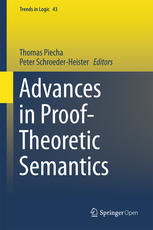

Most ebook files are in PDF format, so you can easily read them using various software such as Foxit Reader or directly on the Google Chrome browser.
Some ebook files are released by publishers in other formats such as .awz, .mobi, .epub, .fb2, etc. You may need to install specific software to read these formats on mobile/PC, such as Calibre.
Please read the tutorial at this link. https://ebooknice.com/page/post?id=faq
We offer FREE conversion to the popular formats you request; however, this may take some time. Therefore, right after payment, please email us, and we will try to provide the service as quickly as possible.
For some exceptional file formats or broken links (if any), please refrain from opening any disputes. Instead, email us first, and we will try to assist within a maximum of 6 hours.
EbookNice Team

Status:
Available0.0
0 reviewsThis volume is the first ever collection devoted to the field of proof-theoretic semantics. Contributions address topics including the systematics of introduction and elimination rules and proofs of normalization, the categorial characterization of deductions, the relation between Heyting's and Gentzen's approaches to meaning, knowability paradoxes, proof-theoretic foundations of set theory, Dummett's justification of logical laws, Kreisel's theory of constructions, paradoxical reasoning, and the defence of model theory.
The field of proof-theoretic semantics has existed for almost 50 years, but the term itself was proposed by Schroeder-Heister in the 1980s. Proof-theoretic semantics explains the meaning of linguistic expressions in general and of logical constants in particular in terms of the notion of proof. This volume emerges from presentations at the Second International Conference on Proof-Theoretic Semantics in Tübingen in 2013, where contributing authors were asked to provide a self-contained description and analysis of a significant research question in this area. The contributions are representative of the field and should be of interest to logicians, philosophers, and mathematicians alike.